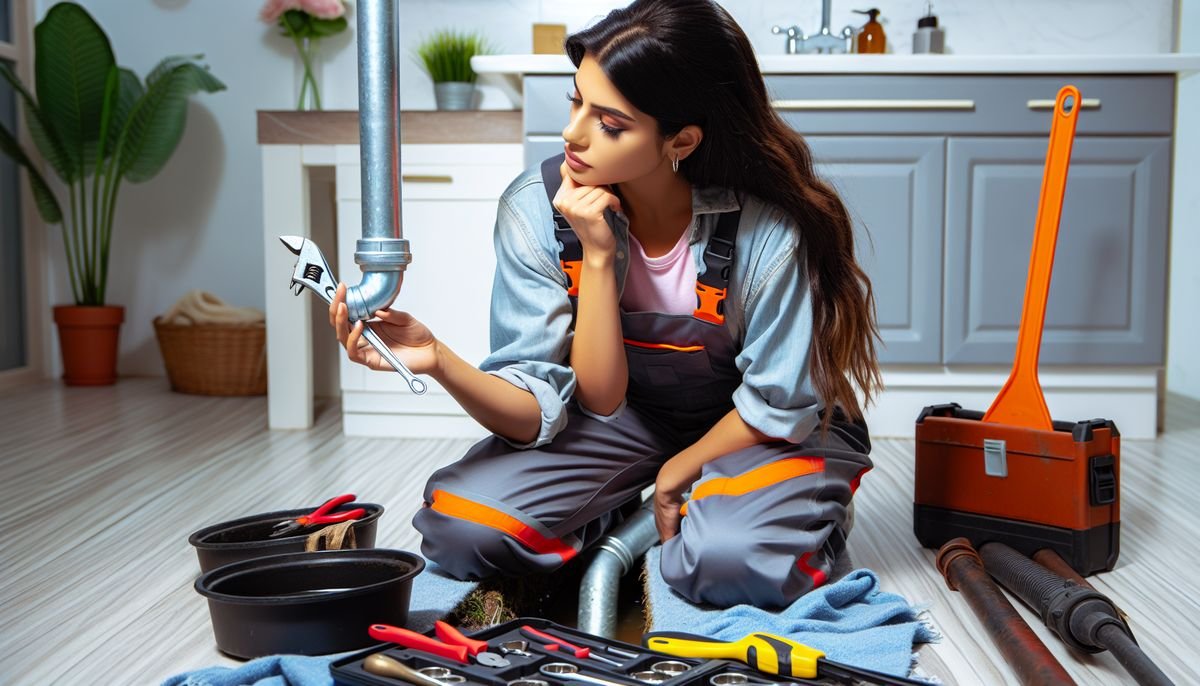5 Tips to Choose the Right Clogged Drain Plumber
When faced with a clogged drain, it’s tempting to try to fix the problem yourself with tools at hand. However, some clogs can be stubborn or indicative of a more serious plumbing issue. In such cases, it’s crucial to choose the right professional plumber to ensure the job is done correctly and safely. Here are five tips to help you select a reliable clogged drain plumber, based on the essential tools they should be proficient with.
Key Takeaways
- Understand the importance of having the right tool for specific clogs, such as a plunger for toilets or a hand-held machine for small drain lines.
- Recognize the need for professional tools like a closet auger for toilets and the appropriate machinery for cutting tree roots in main drains.
- Consider the plumber’s ability to handle emergencies with essential tools like a bucket for catching leaks and rubber gloves for safety.
- Ensure the plumber is equipped with an adjustable wrench and other necessary hardware to address a variety of plumbing issues.
- Confirm that the plumber you choose is experienced and has access to specialized tools like a plumbing snake for those tough-to-reach clogs.
1. Plungers
When faced with a sink backing up, reaching for a plunger is often the first line of defense. Plungers are simple yet effective tools for dislodging minor clogs in sinks and toilets. It’s important to choose the right type of plunger for the task at hand:
- A cup plunger is ideal for flat surfaces, such as sinks or tubs.
- A flange plunger has an extended rubber flap, making it better suited for toilets.
Ensure there’s enough water in the sink to cover the rubber end of the plunger for optimal suction.
If the plunger fails to clear the clog, it may be time to consider other methods, such as a plumbing snake, which can reach deeper into the drain. Remember, not all clogs are created equal, and some may require professional intervention.
2. Adjustable Wrench
An adjustable wrench is an indispensable tool for tackling various plumbing tasks. It’s particularly useful for tightening and loosening pipes and faucets. When selecting an adjustable wrench for plumbing work, consider the wrench’s jaw capacity and handle length to ensure it fits the task at hand.
When using an adjustable wrench, it’s crucial to adjust the jaw to fit snugly around the nut or pipe. This prevents slipping and potential damage to the plumbing fixtures.
Here’s how to use an adjustable wrench effectively:
- Turn the screw mechanism to adjust the jaw opening.
- Position the wrench so that it clamps tightly around the nut or pipe.
- To tighten, turn the wrench in a clockwise direction; to loosen, turn it counter-clockwise.
Remember, while an adjustable wrench is versatile, it’s not a cure-all for every plumbing issue. For more complex problems, consulting a professional plumber may be necessary.
3. Rubber Gloves
When tackling a clogged drain, rubber gloves are essential for maintaining hygiene and safety. They are not only crucial for keeping your hands dry but also protect you from unexpected hazards such as human waste or harsh chemicals found in drain cleaners.
Rubber gloves come in various materials, but for plumbing tasks, nitrile gloves are often recommended. They offer a comfortable wear and are durable enough to withstand the rigors of plumbing work. Here’s why you should consider nitrile gloves:
- Durable: Resistant to cuts and abrasion.
- Snug Fit: Conforms to the shape of the hand.
- Protection: Shields against oils, solvents, and chemicals.
- Flexibility: Allows for ease of movement during extended use.
When selecting gloves, ensure they provide a snug fit and allow for flexibility, as you’ll need dexterity when dealing with intricate plumbing tasks.
4. Bucket
When tackling a clogged drain, a bucket is indispensable. It serves as a catch-all for water and debris, especially when you’re disassembling the P-trap beneath your sink. A bucket’s utility extends beyond just holding liquids; it can also store tools or parts temporarily as you work.
Having a bucket on hand can prevent spills and water damage during plumbing repairs, making cleanup much easier.
While a professional plumbing snake might not be a household necessity, a small, affordable snake can be a valuable addition to your toolkit for minor clogs. Here’s a simple guide to using your bucket effectively during a clog removal:
- Place the bucket under the trap to catch water.
- Slowly remove the existing trap.
- Clear debris and push out the clog if found.
- Reassemble the piping and test the drain.
5. Plumbing Snake
A plumbing snake, also known as a drain auger, is an essential tool for tackling more stubborn clogs that a plunger can’t handle. When dealing with roots in the sewer main or grease in the secondary line, a plumbing snake can navigate through the pipes to dislodge blockages. It’s particularly useful when you experience a floor drain backing up or a toilet backing up.
Using a plumbing snake requires some know-how. It’s important to insert and rotate it carefully to avoid damaging your pipes.
If you’re unsure about using a plumbing snake, consider these tips from experts:
- You can use dish soap, hot water, and paper towels to clean off the auger portion of your plumbing snake after each use.
- If your plunger won’t unclog your toilet, a plumbing snake is your next best option.
Remember, while a plumbing snake can be a handy tool, some clogs are too complex for a DIY approach. In such cases, it’s wise to call a professional plumber who has the expertise to resolve the issue without causing further damage.
Conclusion
Choosing the right plumber for a clogged drain is crucial to ensure the problem is resolved efficiently and effectively. Remember to consider the plumber’s experience, tools, response time, customer reviews, and cost estimates before making your decision. While some minor clogs can be addressed with tools like plungers, buckets, and rubber gloves, more serious plumbing issues require professional intervention. Always prioritize safety and the integrity of your plumbing system by selecting a qualified plumber who can provide the best solution for your specific needs. If you’re ever in doubt or face a plumbing emergency, don’t hesitate to reach out to a trusted professional like 5 Starr Plumbing for reliable service.
Frequently Asked Questions
What are the essential tools I should have at home for minor plumbing issues?
Every homeowner should have basic plumbing tools like plungers, adjustable wrenches, rubber gloves, buckets, and a small plumbing snake for minor clogs.
Can I use the same plunger for both the sink and the toilet?
No, a standard cup plunger is suitable for sinks, while a flange plunger, with an extra flap, is designed for the curved bowl of a toilet.
What should I do if I encounter a serious plumbing emergency?
For serious plumbing emergencies, it’s best to contact a professional plumber like 5 Starr Plumbing at 251-989-0011.
Is it safe to use a plumbing snake for all types of clogs?
While a small plumbing snake can be used for minor clogs, the safest and most effective tool varies depending on the type of drain and severity of the clog.
Why are rubber gloves necessary for plumbing work?
Rubber gloves protect your hands from hazardous situations, including contact with water, human waste, or caustic drain cleaners during plumbing repairs.
What is the best tool to use for a clogged toilet?
The best tool for a clogged toilet is a closet auger, as it is designed to quickly and easily navigate through the tight bends in the toilet bowl.
How can I choose the right plumber for my needs?
When choosing a plumber, look for licensed professionals with good reviews, reasonable rates, and availability to handle your specific plumbing issue.
Can I handle plumbing issues on my own with the right tools?
Some minor plumbing issues can be handled on your own with the right tools, but for complicated or persistent problems, it’s best to call a licensed plumber.

